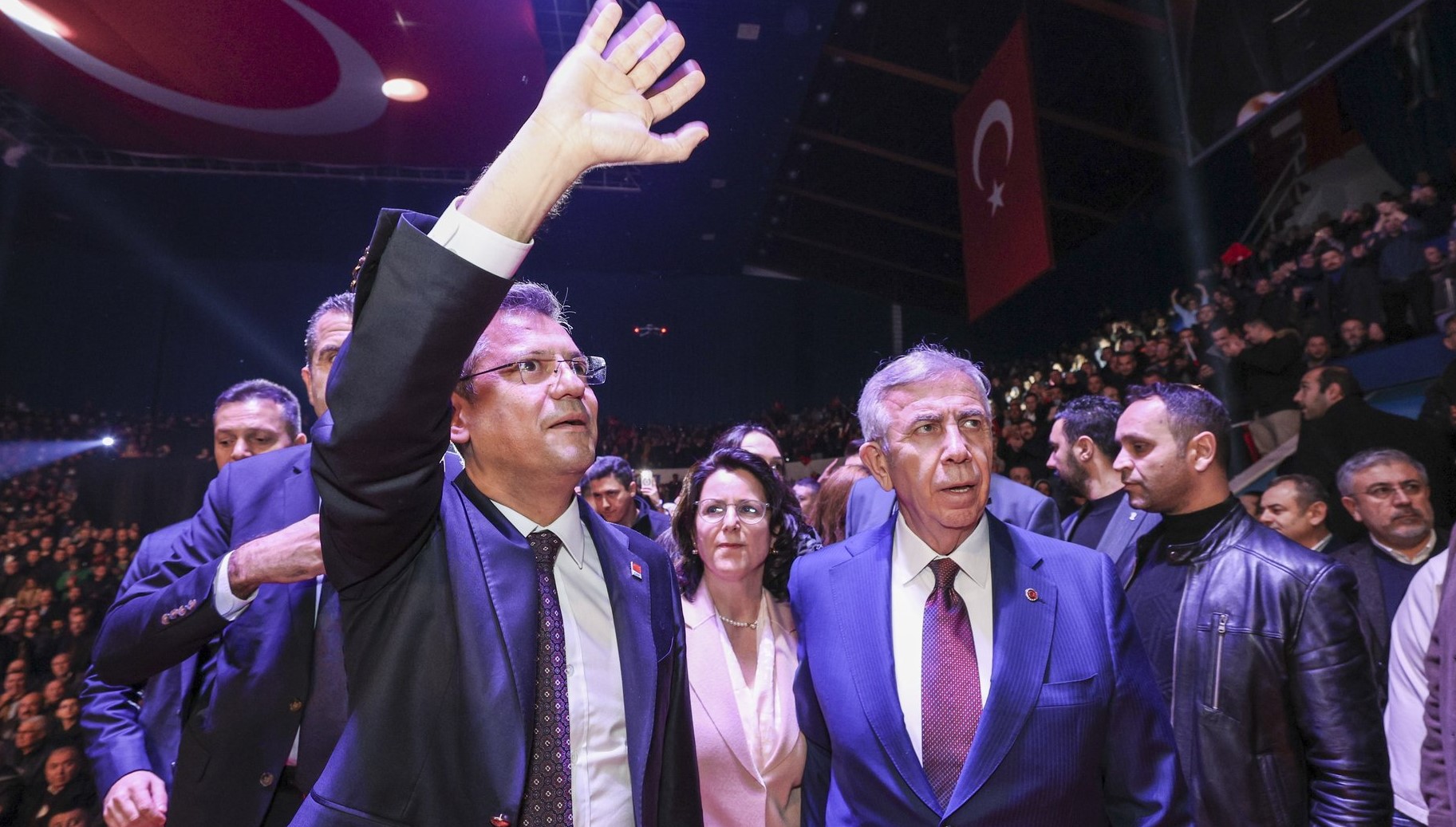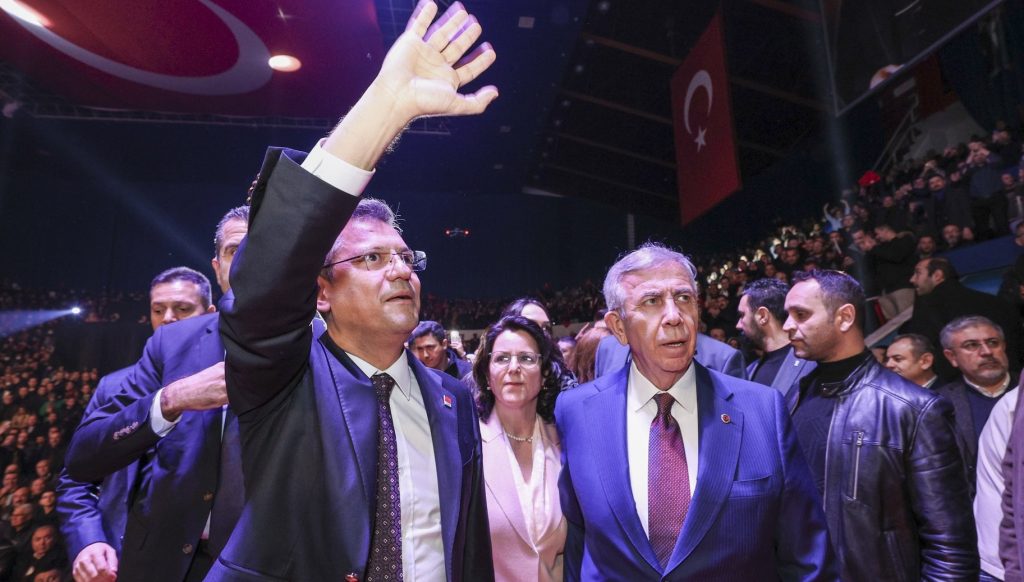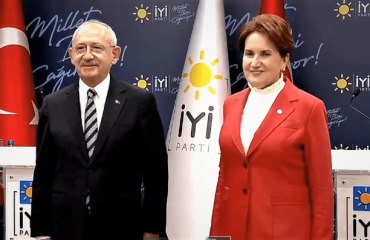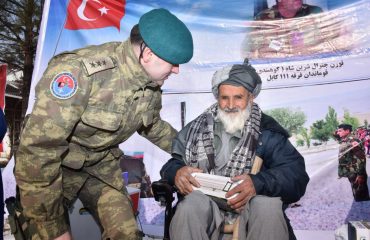

As the March 2024 local elections nearing, Turkish opposition parties redirect their focus towards the Republican People’s Party (CHP), making it the primary target. In the photo, CHP leader Özgür Özel (L) is with Ankara Mayor Mansur Yavaş (R) in a CHP event. (Photo: CHP)
Since the May 2023 election defeat, Türkiye’s main opposition, the Republican People’s Party (CHP), has grappled with internal conflicts that have taken a toll on the party. However, in addition to this, an unprecedented situation has emerged in Turkish politics: the CHP, not President Recep Tayyip Erdoğan’s ruling Justice and Development Party (AKP), appears to be the central target for nearly all opposition parties in their local elections campaign.
Before the May 2023 elections, the CHP was part of a grand coalition named the “Nation Alliance” with the İYİ Party, Felicity Party (Saadet), DEVA Party, Democratic Party (DP), and Future Party (Gelecek). Following the defeat in the elections, the alliance disbanded, with the İYİ Party being the first to exit, laying blame on the CHP and directing criticism towards the main opposition party.
This trend has intensified as Türkiye gears up for local elections scheduled for March 2024.
Over the weekend, the Saadet Party also joined this shift. Birol Aydın, the Saadet Party’s candidate for Istanbul Metropolitan Municipality, asserted that Istanbul cannot afford to lose another five years with the current IBB Mayor.
This change is striking, considering that just a month ago, after the passing of Saadet MP Hasan Bitmez, Saadet sought assistance from the CHP in maintaining their parliamentary group. The CHP provided one MP to Saadet, as a party needs 20 MPs to form a group. Without the CHP, Saadet and Future parties wouldn’t have had sufficient deputies to form a group initially, as they relied on CHP quotas in general elections. This dynamic led to the CHP’s former leader, Kemal Kılıçdaroğlu, losing his seat to Özgür Özel in November.
Intra-opposition dynamics
With due respect, Saadet’s candidate Birol Aydın is unlikely to secure the position of IBB Mayor. Similarly, the İYİ Party’s candidate for Istanbul, Buğra Kavuncu, known for his determination and hard work, faces a challenging path. Going further, the same holds for Başak Demirtaş, if she becomes the candidate for the DEM Party.
When Demirtaş’s name was proposed as the DEM candidate for Istanbul, Ahmet Mahmut Ünlü, also known as “Cübbeli” from the İsmailağa sect, made a noteworthy comment during a TV broadcast. He expressed his approval of Demirtaş’s candidacy, but only “to ensure Mr. Ekrem İmamoğlu loses.”
I do not oppose political parties nominating candidates to run alongside the CHP’s candidate. Every party and eligible citizen has the right to become a candidate. Naturally, each political party aims to showcase the strength of its electorate during elections, exercising its democratic right. Opposition parties does not exist just to support the main opposition to ensure its victory. They have a right to assert themselves and negotiate concessions from dominant parties during election periods.
If İmamoğlu and Yavaş fail to secure victory
My concern lies in the fact that opposition candidates predominantly target the CHP rather than the AKP in their campaign propaganda.
Would opposition parties consider themselves triumphant if AKP candidates replace CHP candidates in Istanbul and Ankara, leading to a CHP loss? Or is their focus solely on securing their voting share? It’s challenging to discern their objectives.
On the other hand, İYİ Party leader Meral Akşener ardently supported İmamoğlu and Yavaş in the May 2023 elections for the opposition’s presidential candidate, asserting that CHP leader Kemal Kılıçdaroğlu was “not a candidate to win.”
Now, in her campaign speeches, she deems the same politicians unfit for the mayoralty. It appears as if there’s a race to vent frustration against Kemal Kılıçdaroğlu for the 2023 election loss, using symbolic figures like İmamoğlu in Istanbul and Yavaş in Ankara.
The CHP’s primary rival is itself
Last week, President Tayyip Erdoğan condemned “those who made Kemal Kılıçdaroğlu a scapegoat and put Özgür Özel in charge.” This week, the CHP is again in the crosshairs. Erdoğan contends that Kılıçdaroğlu’s “problem” is to remove Özgür Özel and regain the CHP chairmanship, causing internal conflict in the party.
There’s usually no smoke without fire. With all his political experience and intuition, Erdoğan seeks to exploit the fissures within the CHP and further weaken the rival. CHP members are already providing ample material to all their rivals.
Some districts, where candidates haven’t been announced yet, seem to be strongholds for the CHP, such as Kadıköy, Bakırköy, Sarıyer, all of Izmir, and Çankaya district in Ankara, where three out of every four people vote for the CHP. Candidate applications are also highest in these areas. Why? One reason is that candidates perceive the anti-Erdoğan sentiment of CHP voters in these districts as a guarantee for election. Hence, the internal strife between factions.
While Çankaya might not be at risk, there is a possibility that CHP’s İmamoğlu or even Yavaş may face challenges. In Istanbul, both the ruling and opposition parties, along with the internally divided CHP, may lose Kadıköy and Sarıyer.


